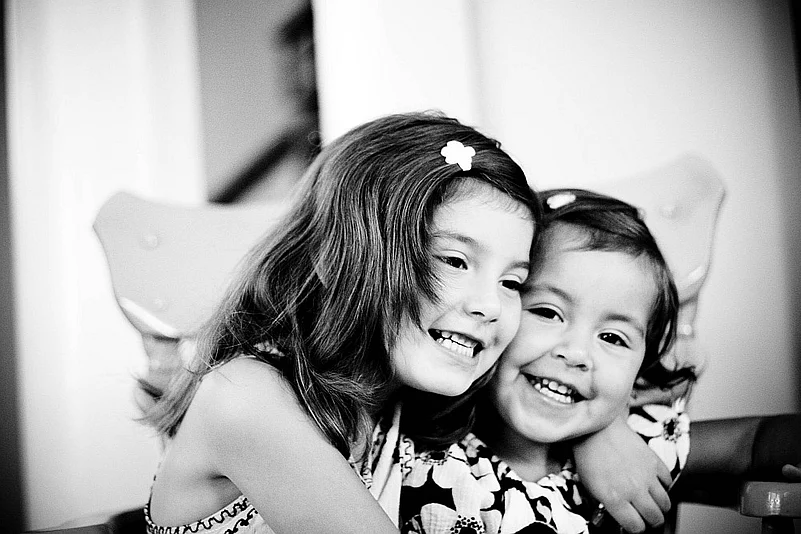When I was little, my siblings invented this game I was very fond of. As the dweeby kid sister I pestered them constantly to play it — it was one of very few I was allowed to participate in. The game consisted of them chucking stones (black pointy ones were perceived as best for the job at hand) high up in the air. My part in the game was to try and estimate where the stone might begin its downward descent and then dart and lurch about to position myself under it, so as to welcome it back by means of providing my head as landing pad.
Psychoanalysts have long posited that older siblings long for a return to their original "omnipotent position" — the time when the younger one wasn't around. By combining the eagerness to please of a labrador puppy and the survival instincts of a baked potato, I was obviously unusually cooperative in the way that younger siblings typically aren't, in helping my older sisters fulfil this genetic imperative.
Nature is full of warm fuzzy heart warming tales like that — apparently sharks eat their siblings in utero (to save the trouble of finding black pointy stones on ocean bed later), and the first seed to sprout from the Indian rosewood tree is rumoured to emit poison to kill the other seed pods. Clearly, the fact that anyone has any younger siblings at all is proof positive that kids are shockingly incompetent at homicide.
Which may be a good thing overall, because after the first few decades of terrible anxiety and rivalry over parental love and affirmation are done, siblings are (along with a sizeable bank balance, good cheekbones and a fabulous chocolate cake recipe) one of the nicest things in life to have. They are the people with whom one shares the longest arc of one's personal history — we are tethered to them from the minute we (or they) are born until the day we die.
Siblings teach us our first and most enduring life lessons. So from them we learn how socialisation, hierarchy, dominance and competition for limited resources works in the real world. And also the major lessons, like how to eat a tractor sized wodge of mithai from the fridge without arousing suspicion (slice every piece very finely around the edges — but be sure to trim the height too); what to do when a dog bites you (bite it back immediately); and how to respond to flowery love letters when you are as capable of comprehending love as you are of photosynthesis ("keep it safely, with your looks you need to hedge your bets...")
Siblings are our shared history and our lifelong memory banks. They've known us since almost before we knew ourselves, they bear witness to our lives, they are privy to our deepest secrets, know what makes us vehemently happy and what makes us apoplectic. When it works well, there is an almost amniotic level of comfort and closeness and an unbreakable bond between siblings. But because there is always a peculiar level of intensity involved, there are very few sibling relationships that are merely lukewarm. If your relationship with your sibling isn't soaring in the blue skies of mutual devotion, it is most often crashing and burning. (Sometimes, both happen together.)
There is a biological basis for this fact -- siblings share 50% of our genes, which makes them half exactly like us and the other half confusingly and maddeningly different. This "othernesss" is exacerbated because we learn to define ourselves in relation to our siblings — we all choose to become what they are not — the "naughty" one to their "good" one, the "sporty" one to their "pretty" one (and in my case of course "the-IQ-of-a-stick-of-celery" one as opposed to my sister's "higher-than-average-level-intellect-which-will-be-dizzying-by-comparison-to-youngest-sibling's-intellect" one.)
Siblings protect you from life's cruel circumstances, but as someone insightfully remarked; in some cases, they ARE life's cruel circumstances. Only a sibling would know how to wound you to the bone. And only a sibling would want to. They can change in a heartbeat from being your closest friend to being your deadliest rival, from being your most trustworthy confidante to the world's biggest blabbermouths, from being your biggest support system to backstabber-in-chief.
But if you can hold the seesaw of your sibling relationships steady long enough to build upon all all the familiarity and the seduction of a shared childhood, that can be a rock solid foundation for what will likely be your longest and closest family relationship. As you acquire other significant relationships, having a sustaining bond with your siblings will still positively impact your mood, health, morale and life satisfaction. And hiccups aside, eventually your siblings will become an unstinting support group, dispensers of advice, loans and applause and allies and partners in the inevitable transition to parental care-giving.
So, if you're lucky enough to have siblings, and luckier enough to have survived them, then pick up the phone, call them. Because no matter that your brother was your mother's favourite, always got better marks than you or the piece of cake and the window seat that you always wanted, he will also always be your midnight partner in crime, your fellow survivor of vacations with hideous relatives, the singular reason you learnt how to punch someone in the face, and the selfless paragon who always wore and obligingly tore the itchy sweaters that your Aunty Indu knitted for both of you. And your sister? She will not only be the reason you wished fervently you were an only child, but will always be as much a part of your identity as the scar she gave you on your left eyebrow by shoving your face rather closer to a table fan than advisable by either the manufacturer or the laws of science.
Go ahead, then — call them. Laugh a little or cry a little, embrace the things you have in common and if you haven't done it yet, let go of the thwarted expectations of your shared history. Because despite everything (murderous impulses included), siblings are entirely too precious to waste.
Of "Real" Brothers And Sisters
Siblings share 50% of our genes, which makes them half exactly like us and the other half confusingly and maddeningly different

Of "Real" Brothers And Sisters
Of "Real" Brothers And Sisters
Published At:
MOST POPULAR
WATCH
MORE FROM THE AUTHOR
PHOTOS
×





















